(I am trying out this space to type out some longer fandom/Tolkien thoughts!)
This show loves using visual imagery to allude to some canonical event it doesn’t have the rights or time to deal with. Here, Galadriel in Valinor is fighting with other elves, possibly her cousins (is the red-haired elf kid meant to make us think of a young Maedhros or Amrod or Amras?) over swan-ships. It’s not the Kinslaying at Alqualondë but it’s clearly meant as a nod to that:
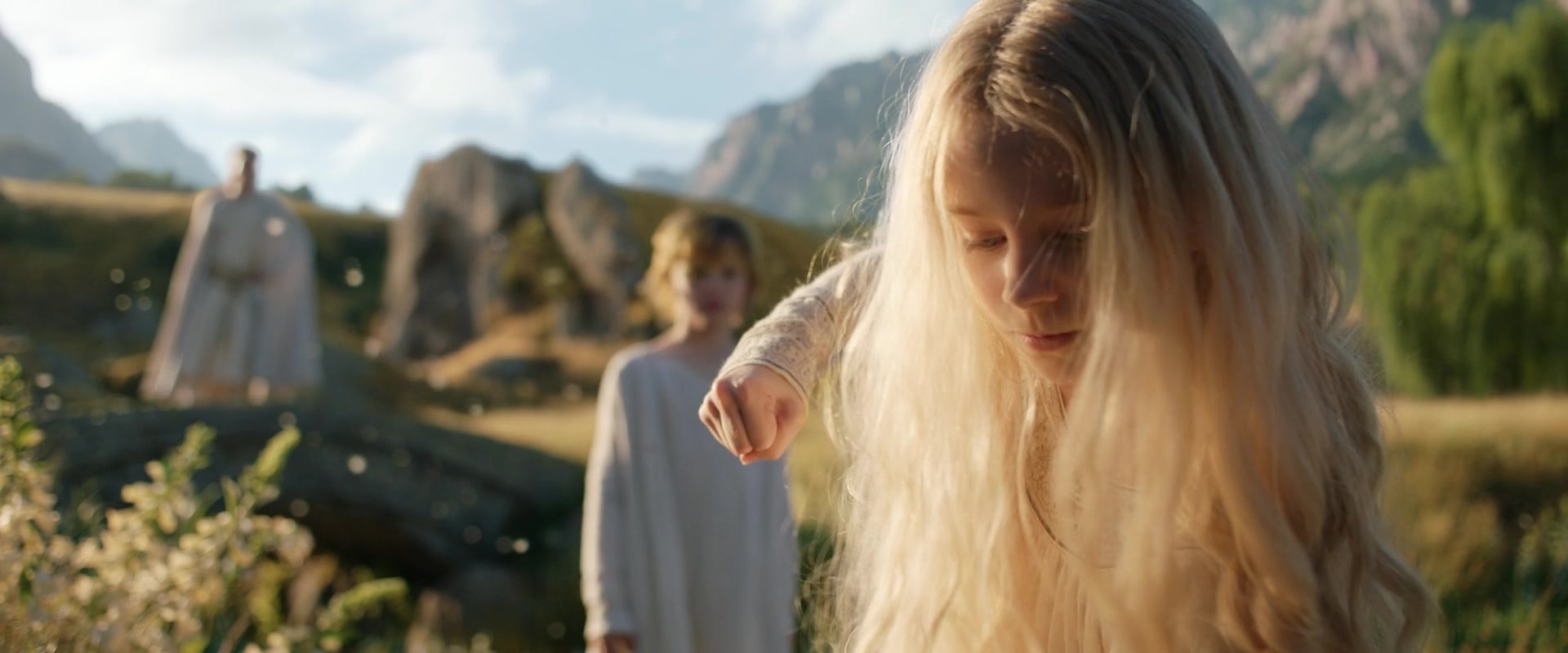
And it tells you something about her personality, whether or not you know that story.
Here, she’s leading her company over the ice. It’s Forodwaith, not the crossing over the Helcaraxë that brought her to Middle-earth, but it’s meant to tell you the same things about her that that story tells: her bravery, her stubbornness, her position as a leader, and her will to press on:
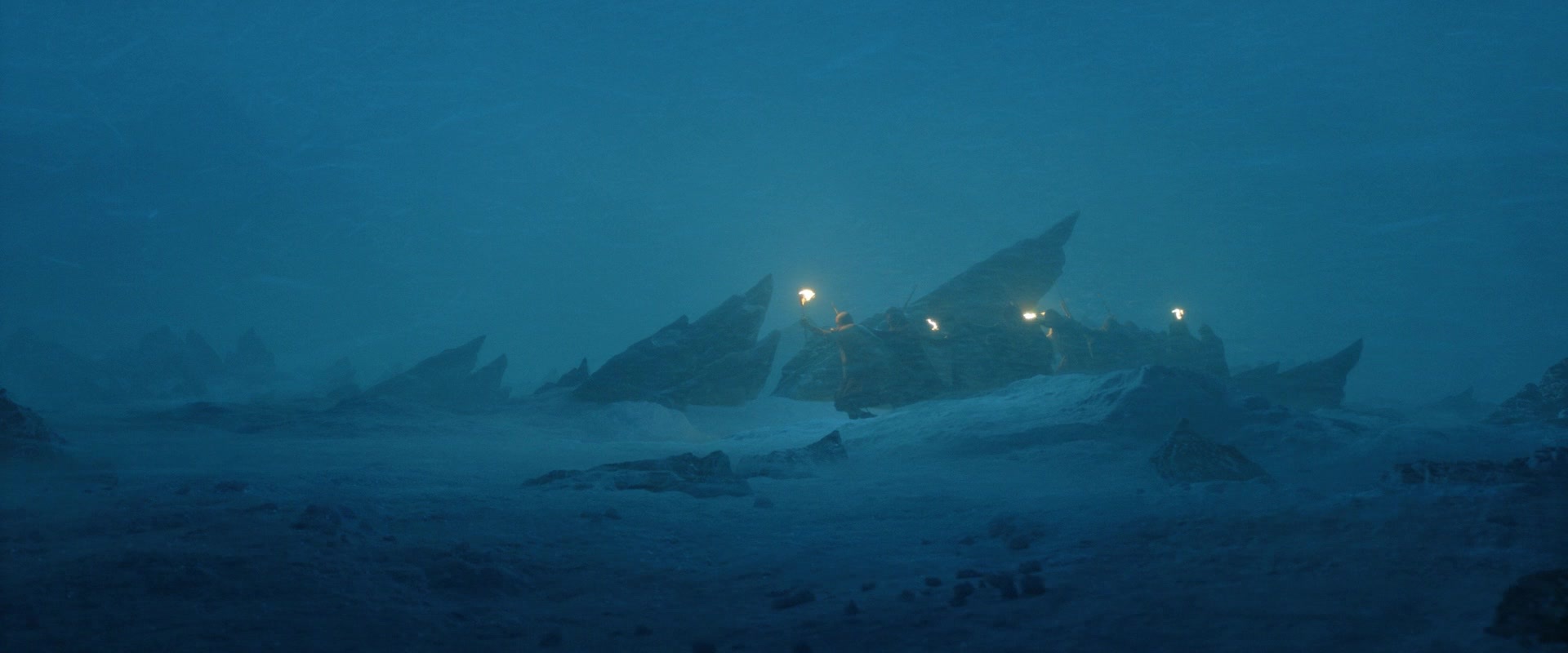
And here she is on a battlefield after a battle.
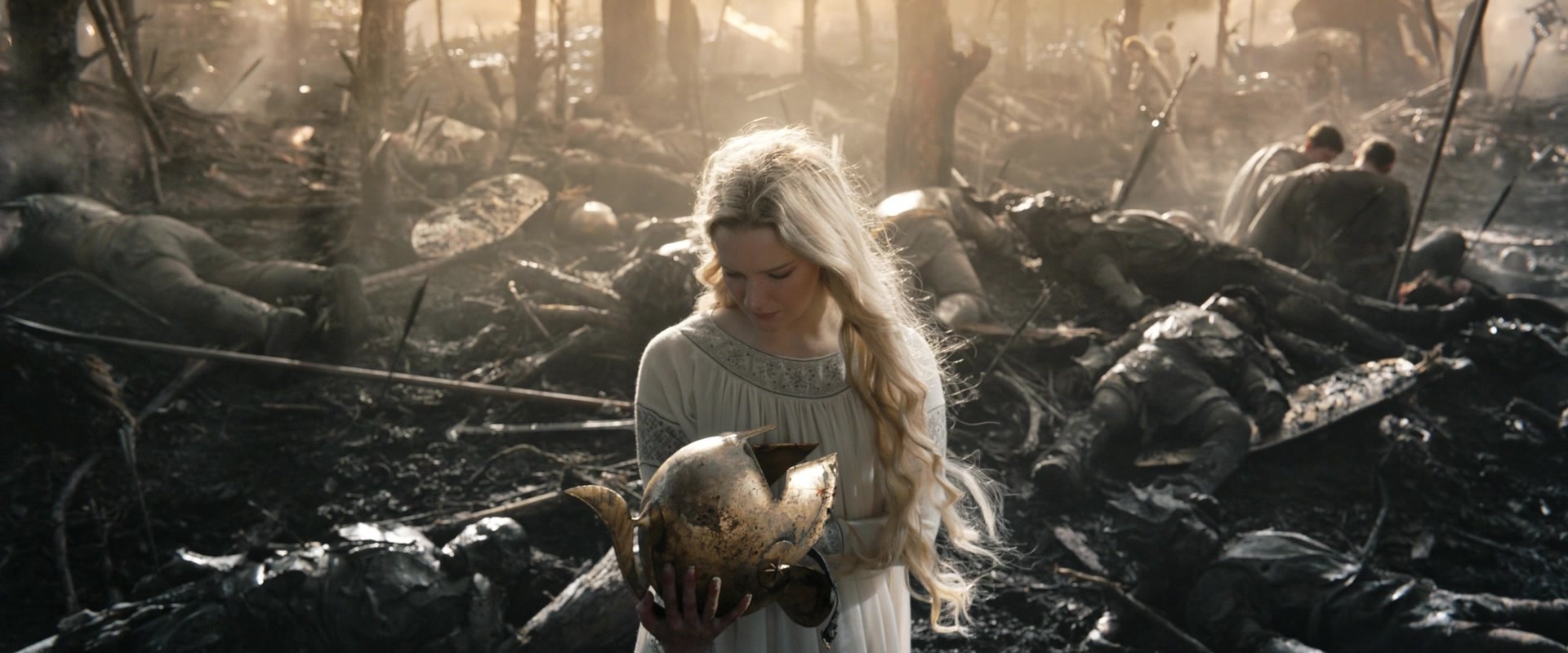
The battle itself when we see it is… maybe meant to feel like the Nírnaeth Arnoediad, which was a huge disaster for the elves. (The helmet Galadriel’s holding has a Feanorian star on it - near her little finger if you zoom in.) But I think the visual imagery of the aftermath is meant to feel like something different.
On the left, Galadriel’s battlefield; on the right, the Somme, where Tolkien fought.
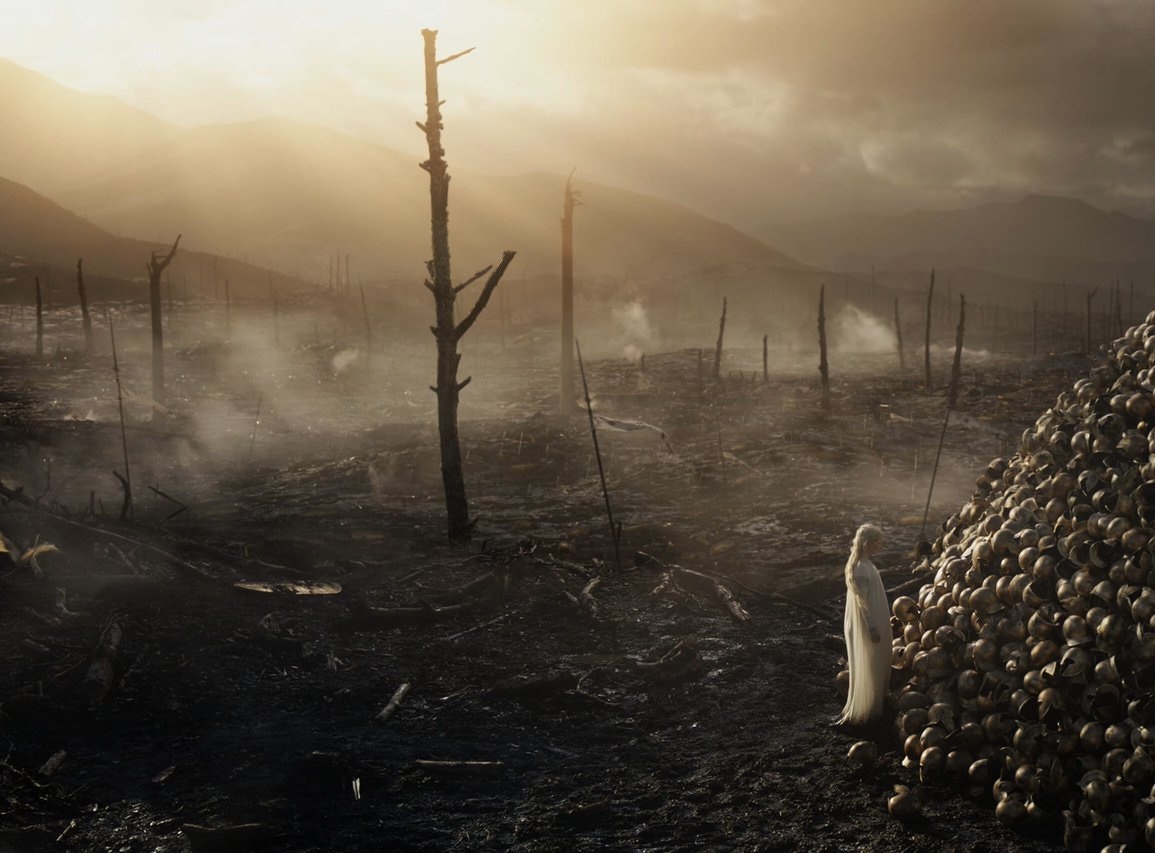
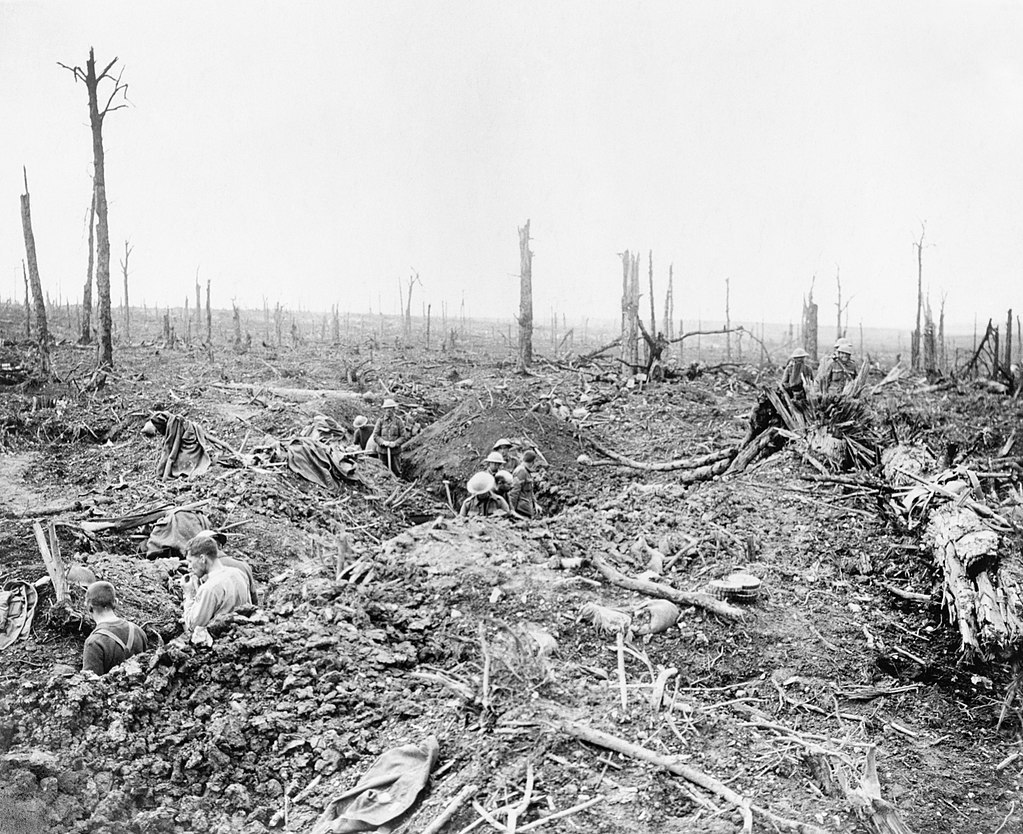
I don't think this battle is meant to be an allegory for the Somme, but I think it's meant to call to mind similar things: the hell and waste and devastation of battle, on a scale that the people involved had not imagined possible.
One of the few things we know about TROP Celeborn at this point is that he rode away to a battle (unnamed) and never came back. Galadriel must presume he’s dead; look at the devastation around her and you can see why. A few people have theorised that the reason she's in her white dress in these scenes is that she's searching for him. If that's so, we know she doesn't find him. It's also implied that 'the war' he went off to is this one against Morgoth but it's not explained why he went: in book canon he's not Noldor and his king forbade any of his people to fight alongside them, on the grounds they had already brought too much death and devastation as it was.
Whyever he went to battle, we also know that he went underestimating it and unprepared for it. When she mentions him going to war says that his armour didn’t fit and that she teased him for it. She says ‘the war seemed so very far away’. If she’s in Doriath at this time, which isn’t named but sounds likely, then this must be especially so: the Doriath version of Celeborn (he has different origin stories) has lived his whole life in a magically protected land of peace and loveliness surrounded by a continent of war. And then he went to a battle that presumably looked like the one above, and never came back.
That, for Tolkien’s generation, was the story of a lot of men going off to the First World War. The gulf between expectation and reality at the start of the war was immense and while many wars in many places have that cultural memory, this one was the big one for Tolkien’s generation. Many people really believed when the war began in 1914 that it would be ‘over by Christmas’, lots of young men enthusiastically joined up to do their country proud (including boys lying about their age, they were so keen to go) and the soldiers - and the country as a whole - were massively unprepared for the scale and horror of modern, industrialised warfare. Tolkien went to war in 1916; he wrote later (in the LOTR preface) that by 1918, all but one of his close friends were dead.
The war was a huge influence on his work. Sometimes directly inspired (he wrote that the Dead Marshes in Lord of the Rings ‘owe something to Northern France after the Battle of the Somme’), sometimes more indirectly, like in this from Christopher Tolkien:
In TROP, Galadriel’s line to Theo that she met Celeborn when he saw her dancing in a glade of flowers is meant to be a shorthand reference to Beren and Lúthien. But this part of Beren and Lúthien’s story was also inspired by Tolkien’s own life during the war: his wife Edith dancing for him in the woods in Yorkshire, in 1917, when he was home from the trenches recovering from illness.
Again I don’t think TROP is trying to show a literal allegory for the Somme and the war, but I think it’s trying to show something that feels like it, both in that devastated battlefield and in the idea of brave and idealistic young soldiers keen to go off to a distant war that they’re unprepared for and can’t possibly comprehend the horror of. Because it was so important and so formative for Tolkien, and because the writers want to glorify courage without glorifying war.
So: Celeborn. In TROP he went away to the war but we know he’s not dead, even though Galadriel reasonably thinks he must be. And they have a reasonable amount of leeway to play with him as a character around that because… well, Tolkien needed a Mr Galadriel and didn’t care that much about fleshing Celeborn out. He fights in the Second Age, he’s ‘wise’, and he really dislikes dwarves.
The dwarf thing you can read as just elf-dwarf antagonism, but if you want to put some texture behind it then you can read it as a legacy of the dwarves fighting with the elves in Doriath and killing their king, Celeborn’s relative. This does not make it okay for him to be rude to Gimli in LOTR and blame him for bringing trouble to Lothlorien - which Galadriel slaps him down for in front of everyone - but it does make him more interesting, if part of his character is that he’s still haunted by the wars of the First Age. And if we are going to be at all invested in him as a character in TROP they will want him to be interesting.
TV audiences don’t generally find established relationships that interesting, Celeborn is just not that fleshed out or interesting a character to begin with, and so TV storytelling would require more than "yay happy reunion" if it’s going to create any kind of interest at all in what we all know is the canon endgame pairing. They aren’t going to use Celeborn to ditch the Galadriel and Sauron connection (which the creators have been explicit about building the whole show on), but she's got to end up with him without making everyone think "who?" or feeling sorry for her. So my bet is that if he is indeed coming in season 2, they'll a) give him his own storyline, separate from hers, and b) create some kind of tension in their relationship.
And so: where is he? In show continuity he's been missing for centuries at this point. Much of the fandom speculation is that he’s been held prisoner by Sauron or by Adar. I can’t quite see how this fits plot-wise - the only prisoners we know that either of them have are the elves digging the tunnels for Adar, who (if we believe what he says about Sauron’s work) haven’t been doing this for all that long. Sauron does canonically have a habit of putting enemies in prisons and then keeping them there indefinitely but TROP Sauron doesn’t have any fortresses with prisons that we know about and doesn’t seem in a place where he’s got that kind of power. Perhaps in Rhûn, where it seems there’s a Sauron cult? Although there’s no obvious reason why Celeborn would be there or what the purpose would be of keeping him.
Also, coming back from literal centuries of captivity and torture or whatever else is going to make it difficult for his plot to be about anything other than that and his recovery from that, because: centuries. Maedhros was held captive for thirty years and begged Fingon to kill him. What’s three hundred years going to do? Seems unlikely Celeborn would be swooping right back into the action in any sense, or be recognisably himself at all.
But. Assuming the show wants us to be interested in him as his own character rather than just as a plotdevice to stop Galadriel getting a bit too close to the Dark Lord. And assuming we’re still supposed to see him as a casualty of war, but in another sense than dying.
Maybe what’s keeping him from Galadriel - and the Noldor, and the war that Gil-galad is leading - isn’t that he’s locked in prison and can’t get there. Maybe he’s staying away from it all, including her, on purpose. And maybe he’ll get his own storyline, where he isn’t just Mr Galadriel, where we get to see why and how he finds his way back?
This show loves using visual imagery to allude to some canonical event it doesn’t have the rights or time to deal with. Here, Galadriel in Valinor is fighting with other elves, possibly her cousins (is the red-haired elf kid meant to make us think of a young Maedhros or Amrod or Amras?) over swan-ships. It’s not the Kinslaying at Alqualondë but it’s clearly meant as a nod to that:

And it tells you something about her personality, whether or not you know that story.
Here, she’s leading her company over the ice. It’s Forodwaith, not the crossing over the Helcaraxë that brought her to Middle-earth, but it’s meant to tell you the same things about her that that story tells: her bravery, her stubbornness, her position as a leader, and her will to press on:

And here she is on a battlefield after a battle.

The battle itself when we see it is… maybe meant to feel like the Nírnaeth Arnoediad, which was a huge disaster for the elves. (The helmet Galadriel’s holding has a Feanorian star on it - near her little finger if you zoom in.) But I think the visual imagery of the aftermath is meant to feel like something different.
On the left, Galadriel’s battlefield; on the right, the Somme, where Tolkien fought.


I don't think this battle is meant to be an allegory for the Somme, but I think it's meant to call to mind similar things: the hell and waste and devastation of battle, on a scale that the people involved had not imagined possible.
One of the few things we know about TROP Celeborn at this point is that he rode away to a battle (unnamed) and never came back. Galadriel must presume he’s dead; look at the devastation around her and you can see why. A few people have theorised that the reason she's in her white dress in these scenes is that she's searching for him. If that's so, we know she doesn't find him. It's also implied that 'the war' he went off to is this one against Morgoth but it's not explained why he went: in book canon he's not Noldor and his king forbade any of his people to fight alongside them, on the grounds they had already brought too much death and devastation as it was.
Whyever he went to battle, we also know that he went underestimating it and unprepared for it. When she mentions him going to war says that his armour didn’t fit and that she teased him for it. She says ‘the war seemed so very far away’. If she’s in Doriath at this time, which isn’t named but sounds likely, then this must be especially so: the Doriath version of Celeborn (he has different origin stories) has lived his whole life in a magically protected land of peace and loveliness surrounded by a continent of war. And then he went to a battle that presumably looked like the one above, and never came back.
That, for Tolkien’s generation, was the story of a lot of men going off to the First World War. The gulf between expectation and reality at the start of the war was immense and while many wars in many places have that cultural memory, this one was the big one for Tolkien’s generation. Many people really believed when the war began in 1914 that it would be ‘over by Christmas’, lots of young men enthusiastically joined up to do their country proud (including boys lying about their age, they were so keen to go) and the soldiers - and the country as a whole - were massively unprepared for the scale and horror of modern, industrialised warfare. Tolkien went to war in 1916; he wrote later (in the LOTR preface) that by 1918, all but one of his close friends were dead.
The war was a huge influence on his work. Sometimes directly inspired (he wrote that the Dead Marshes in Lord of the Rings ‘owe something to Northern France after the Battle of the Somme’), sometimes more indirectly, like in this from Christopher Tolkien:
‘He told me once that he began The Silmarillion ‘in army huts, crowded, filled with the noise of gramophones’; indeed some lines of verse in which appear the Seven Names of Gondolin are scribbled on the back of a paper setting out the chain of responsibility in a battalion.’
In TROP, Galadriel’s line to Theo that she met Celeborn when he saw her dancing in a glade of flowers is meant to be a shorthand reference to Beren and Lúthien. But this part of Beren and Lúthien’s story was also inspired by Tolkien’s own life during the war: his wife Edith dancing for him in the woods in Yorkshire, in 1917, when he was home from the trenches recovering from illness.
Again I don’t think TROP is trying to show a literal allegory for the Somme and the war, but I think it’s trying to show something that feels like it, both in that devastated battlefield and in the idea of brave and idealistic young soldiers keen to go off to a distant war that they’re unprepared for and can’t possibly comprehend the horror of. Because it was so important and so formative for Tolkien, and because the writers want to glorify courage without glorifying war.
So: Celeborn. In TROP he went away to the war but we know he’s not dead, even though Galadriel reasonably thinks he must be. And they have a reasonable amount of leeway to play with him as a character around that because… well, Tolkien needed a Mr Galadriel and didn’t care that much about fleshing Celeborn out. He fights in the Second Age, he’s ‘wise’, and he really dislikes dwarves.
The dwarf thing you can read as just elf-dwarf antagonism, but if you want to put some texture behind it then you can read it as a legacy of the dwarves fighting with the elves in Doriath and killing their king, Celeborn’s relative. This does not make it okay for him to be rude to Gimli in LOTR and blame him for bringing trouble to Lothlorien - which Galadriel slaps him down for in front of everyone - but it does make him more interesting, if part of his character is that he’s still haunted by the wars of the First Age. And if we are going to be at all invested in him as a character in TROP they will want him to be interesting.
TV audiences don’t generally find established relationships that interesting, Celeborn is just not that fleshed out or interesting a character to begin with, and so TV storytelling would require more than "yay happy reunion" if it’s going to create any kind of interest at all in what we all know is the canon endgame pairing. They aren’t going to use Celeborn to ditch the Galadriel and Sauron connection (which the creators have been explicit about building the whole show on), but she's got to end up with him without making everyone think "who?" or feeling sorry for her. So my bet is that if he is indeed coming in season 2, they'll a) give him his own storyline, separate from hers, and b) create some kind of tension in their relationship.
And so: where is he? In show continuity he's been missing for centuries at this point. Much of the fandom speculation is that he’s been held prisoner by Sauron or by Adar. I can’t quite see how this fits plot-wise - the only prisoners we know that either of them have are the elves digging the tunnels for Adar, who (if we believe what he says about Sauron’s work) haven’t been doing this for all that long. Sauron does canonically have a habit of putting enemies in prisons and then keeping them there indefinitely but TROP Sauron doesn’t have any fortresses with prisons that we know about and doesn’t seem in a place where he’s got that kind of power. Perhaps in Rhûn, where it seems there’s a Sauron cult? Although there’s no obvious reason why Celeborn would be there or what the purpose would be of keeping him.
Also, coming back from literal centuries of captivity and torture or whatever else is going to make it difficult for his plot to be about anything other than that and his recovery from that, because: centuries. Maedhros was held captive for thirty years and begged Fingon to kill him. What’s three hundred years going to do? Seems unlikely Celeborn would be swooping right back into the action in any sense, or be recognisably himself at all.
But. Assuming the show wants us to be interested in him as his own character rather than just as a plotdevice to stop Galadriel getting a bit too close to the Dark Lord. And assuming we’re still supposed to see him as a casualty of war, but in another sense than dying.
Maybe what’s keeping him from Galadriel - and the Noldor, and the war that Gil-galad is leading - isn’t that he’s locked in prison and can’t get there. Maybe he’s staying away from it all, including her, on purpose. And maybe he’ll get his own storyline, where he isn’t just Mr Galadriel, where we get to see why and how he finds his way back?